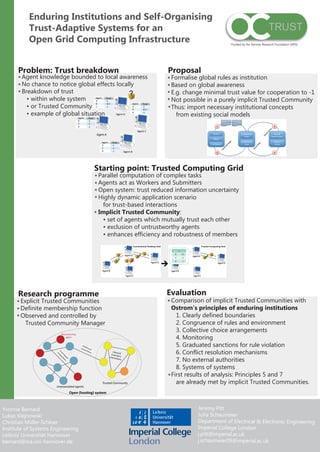
Enduring Institutions and Self-Organising Trust-Adaptive Systems
- 1. Enduring Institutions and Self-Organising Trust-Adaptive Systems for an Open Grid Computing Infrastructure Funded by the German Research Foundation (DFG) Problem: Trust breakdown Proposal Agent knowledge bounded to local awareness Formalise global rules as institution No chance to notice global effects locally Based on global awareness Breakdown of trust ? E.g. change minimal trust value for cooperation to -1 • within whole system Agent A 6 Trust -1 Not possible in a purely implicit Trusted Community • or Trusted Community B -0.5 Agent Trust C -1 A 6 B -1 -0.5 Thus: import necessary institutional concepts • example of global situation Agent D D -1 from existing social models Agent Trust B 6 -1 C -1 D -1 Agent C Agent A Agent Trust A 6 -1 C -1 D -1 Agent B Starting point: Trusted Computing Grid Parallel computation of complex tasks Agents act as Workers and Submitters Open system: trust reduced information uncertainty Highly dynamic application scenario for trust-based interactions Implicit Trusted Community: • set of agents which mutually trust each other • exclusion of untrustworthy agents • enhances efficiency and robustness of members Conventional Desktop Grid Trusted Computing Grid Research programme Evaluation Explicit Trusted Communities Comparison of implicit Trusted Communities with Definite membership function Ostrom’s principles of enduring institutions Observed and controlled by 1. Clearly defined boundaries Trusted Community Manager 2. Congruence of rules and environment Misconducting 3. Collective choice arrangements agent 4. Monitoring Out inte bound 5. Graduated sanctions for rule violation 6. Conflict resolution mechanisms rac tion Inboun s Tr tera d us c (memb in t-b tio interac er) 7. No external authorities as ns tions ed 8. Systems of systems First results of analysis: Principles 5 and 7 Trusted Community are already met by implicit Trusted Communities. Unassociated agents Open (hosting) system Yvonne Bernard Jeremy Pitt Lukas Klejnowski Julia Schaumeier Christian Müller-Schloer Department of Electrical & Electronic Engineering Institute of Systems Engineering Imperial College London Leibniz Universität Hannover j.pitt@imperial.ac.uk bernard@sra.uni-hannover.de j.schaumeier09@imperial.ac.uk
